Q & A with Amanda Mok ’11
Winner of the 2011 MITSO Concerto Competition
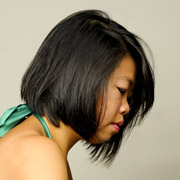
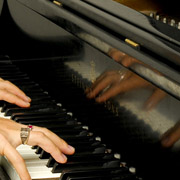
The MIT Music section is pleased to announce that Amanda Mok ’11, a double major in Biological Engineering and Music, is the 2011 winner of the MIT Symphony Orchestra Concerto Competition. Mok will perform the first movement of Tchaikovsky's Piano Concerto No.1, with MITSO, on March 11, 2011. Details below
A classic, multi-talented MIT student, Amanda is a successful scholar and accomplished musician, and she is deeply engaged in the Institute community, serving as a MedLink for her dorm, as co-Director of the Leadership Training Institute, and as the President of MITSO.

Joya Abbott-Graves had a chance to talk with Amanda recently, to learn more about her musical life, and what comes next.
Q. First, let me ask, why did you choose to play the Tchaikovsky’s Piano Concerto No.1 for the competition?
A: I chose this concerto because Tchaikovsky is my favorite composer —and because I absolutely love this piece. It also happens to be the first concerto I ever heard live. My piano teacher at the time, James Gardner, was conductor of the Pro Arte Symphony, which performed the work, featuring soloist Jon Nakamatsu. I was immediately captivated by the world the music created, by the sound and prominence of the orchestra, and how the piano fit in seamlessly. Now that I know the piece well, I also appreciate how Tchaikovsky orchestrated different parts, creating places that showcase beautiful melodies, and the technical prowess of various musicians in the orchestra, as well as the piano soloist.
Q: What do you like about playing this concerto, and what are its challenges?
A. What I love most is the scope of this music—the great ranges of dynamics, timbres, and emotions. There are places where controlled diligence is required, places for abandon, and places where the intimacy of the music allows you to question yourself. This spectrum is also the challenge; you have to do the small-scale and large-scale, and everything in between. This piece is also incredibly challenging technically. Even Arthur Rubinstein, on first hearing the piece, said, "Certainly there are passages which even the greatest virtuoso is glad to survive unscathed."
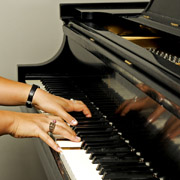
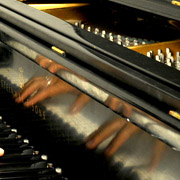
"David Deveau (MIT Senior Lecturer in Music) encouraged me
to pursue solo piano again and to audition for the Emerson Music Scholarship."
— Amanda Mok '11
Q. This win came out of the blue in many ways…aren’t you principally a violinist in MITSO?
A. Yes, although I started playing piano first, at age four, and then violin at eight. Once I got to MIT, in order to manage my time, I only performed on violin with MITSO. Then, in my junior year I returned to the piano, and joined the Chamber Music Society. During that year, my ensemble was coached by David Deveau (MIT Senior Lecturer in Music) who encouraged me to pursue solo piano again and to audition for the Emerson Music Scholarship. I did, and in September 2010, I received the Emerson Music Scholarship for piano studies. That’s when I started preparing the Tchaikovsky concerto.
I discovered there was a learning curve, of course, to regain some technique, but also that my musical vision had changed. In high school, my musical goal was to “do the right thing"—to bow correctly, finger correctly, to phrase correctly. Now, I have more passion for the music, and a more personal musical voice, and this emerged, ironically, while I was taking time off from personal, solo work, and playing violin with orchestral and chamber groups.
Q: What has it been like studying privately with David Deveau?
A: Working with David Deveau has helped me translate that more personal voice I had developed while doing orchestral music into a voice for piano. He has taught me to approach a page of music in different ways—to find the one that resonates with my voice, to treat each musical passage as a means of expression. Honestly, if it weren’t for his encouraging me to start studying piano again, I would not have auditioned for the Emerson Program and come to this point. And for that I am very, very grateful. I am also really grateful to have parents who have always supported my musical endeavors.
Q: You’ve played in MITSO under the Direction of Adam Boyles for almost 4 years. How do you imagine this concerto experience will be under his baton?
A: Adam pays attention to the color and energy of musical phrases, which is very important in the Tchaikovsky piece to create contrast between sections. He also gives space for musicians to give personal interpretations and to "do their thing," which will let me interact pretty directly with the orchestra.
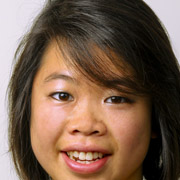
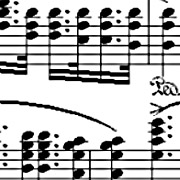
"I am currently applying to medical school, and I hope
to dedicate a few years to Doctors Without Borders.
As for music, I hope to continue playing music for the rest of my life."
Q: How do you imagine that playing this music with an orchestra will differ from playing it on your own?
A: I have never performed this particular piece with an orchestra before, so this will be very exciting. In 2007, I won the concerto competition for the Oakland Youth Orchestra and performed the Grieg Piano Concerto—so I have a bit of experience playing with an orchestra. Playing with an orchestra makes the music come even more alive because there is a huge ensemble of musicians, each with their own personal style and take on the music. This gives me more opportunities to feed off another musician's interpretation and perhaps transform the concerto into something different than what it was before.
Q: You usually play violin with MITSO, and you are an officer of the group. Now you are taking on the roles of soloist and pianist. How do you anticipate these various MITSO roles coming together?
A: Because I have performed for a while as a violinist with this orchestra, I have a good idea of what MITSO can do, and how the group can react and adapt to a piece. Also, because I am so involved with MITSO, I have personal relationships with many of the musicians in the orchestra—which makes the forthcoming concert experience feel more like friends getting together to have fun and create music.
Q: Now for the burning question. How do you find time for all of this on top of your academics?
A: I am pursuing a double degree in Biological Engineering and Music, which means that I have a really heavy course load; I am also involved in a number of activities on campus. I am a Co-Director of the Leadership Training Institute, which teaches leadership skills and philosophies to underprivileged high school students around Boston. As a MedLink, I provide medical care to undergraduates in my dorm. In the past, I have conducted research on 3D cell culture and cancer in the Yannas and Engelward labs. But music has been a part of my life for as long as I can remember, and playing the piano or violin is a pure joy. When I focus on a piece of music, I go to a place where nothing else exists but the music and me. That being said, time is always lacking, and sleep is often wanting!
Q: Now that you’ve won the Concerto Competition, what’s next for you?
A: I am currently applying to medical school, and I hope to dedicate a few years, perhaps between medical school and residency, to serving in Medecins Sans Frontieres (Doctors Without Borders). As for music, I hope to continue playing music for the rest of my life.
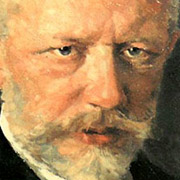
Writer and Interviewer: Joya-Abbott Graves
Photographs of Amanda Mok: Sina Mohammadi
Editor/Art Director: Emily Hiestand
Suggested Links
MITSO
http://web.mit.edu/mitso
Music Program
http://web.mit.edu/music/
David Deveau
http://web.mit.edu/music/facstaff/deveau.html
Adam Boyles
http://web.mit.edu/music/facstaff/boyles.html
Chamber Music Society
http://web.mit.edu/music/performance/instrumental/cms.html
Emerson Program
http://web.mit.edu/music/performance/emerson.html
MedLinks
http://web.mit.edu/medlinks/www/
Leadership Training Institute
http://www.mitlti.org/
MITSPO
http://www.mitspo.org/
Kresge Auditorium
http://whereis.mit.edu/?mapterms=kresge+auditorium&mapsearch=go